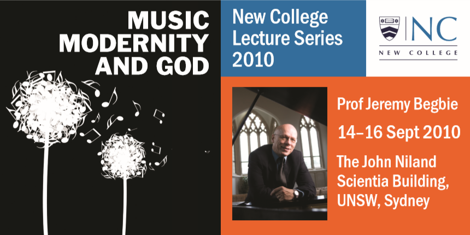Music, Modernity and God

In September 2010, Professor Jeremy Begbie presented the New College Lecture Series. The lectures were held at The John Niland Scientia Building on campus at the University of New South Wales and were presented over three nights to several hundred people.
Scarcely a day goes by when we are not surrounded by music: it is pervasive. But what we can easily overlook is the part music has played in the debates surrounding the pivotal issues that have shaped our culture, issues that at their deepest level concern belief in God.
In his final talk Professor Begbie concluded that yes, music is much more than just an accompaniment to life, it is an important part of the life God has given us and both reflects and speaks of God’s purposes for us. He suggested that if we didn’t have music we would be all the poorer because music can help us to ‘read’ the story of our culture with the eyes of Christian faith, responding in fresh ways to some of the deepest dilemmas and truths of our time. Furthermore, music offers metaphors that can help us to understand the deep truths of Christianity – God, creation, freedom, rebellion and sin, salvation and redemption, the new creation to come and the fulfilment of God’s promises in Christ. He led us to this conclusion by teaching us over three nights using word, image, recorded music and performance on the piano. It was a memorable and deeply challenging series.
Professor Jeremy Begbie
Jeremy Begbie, BA, BD, Ph.D., LRAM, ARCM, FRSCM is Thomas A. Langford Research Professor at Duke Divinity School, Duke University. He was previously the Associate Principal of Ridley Hall, Cambridge, as well as an Affiliated Lecturer in the Faculty of Divinity, University of Cambridge. In addition, he was an Honorary Professor of Theology at the Institute for Theology, Imagination, and the Arts at St Mary's College, University of St. Andrews in Scotland, as well as the Associate Director of the program.
He is known for his writing and lecturing in the subdiscipline of theology which examines the relationship between theology and the arts. In September 1997 he founded the Theology Through the Arts project, whose primary aim is "to discover and demonstrate ways in which the arts can contribute towards the renewal of Christian theology". Aspects of the project include conversation amongst artists and theologians, academic lectures, publications, and arts festivals.
In January 2009, he left his posts at St Andrews and at Cambridge to take up his position at Duke Divinity School. Prof Begbie's publications include: Resounding Truth: Christian Wisdom in the World of Music and Theology, Music, and Time.
Tuesday 14 September | Creativity – Can we be creative in the midst of God’s creation?
Human creativity is often seen as merely a matter of bringing order to the physical world. Creativity and discovery are assumed to work against each other. The roots of this assumption were explored before Prof Begbie examined some of the music of J.S. Bach in order to open up a fuller, Trinitarian vision in which discovery is integral to all human making.
Wednesday 15 September | Freedom – Can we be free with God around?
It has been said that the quest for freedom defines the modern age. And it is often assumed that the more God is involved in our lives, the less freedom we have. In this lecture, Jeremy Begbie showed that ‘musical space’ can help us develop a far more biblical account of human freedom and discover that God is not freedom’s enemy.
Thursday 16 September | Language – Can we speak about God without words?
While language is powerful, many point to its severe limits. This lecture explored the ways music has been caught up in the debate about the power and limits of language. Many say music can ‘transcend’ words. Prof Begbie asked, ‘What place is there for music in a faith that depends on God using human words to make himself known?’